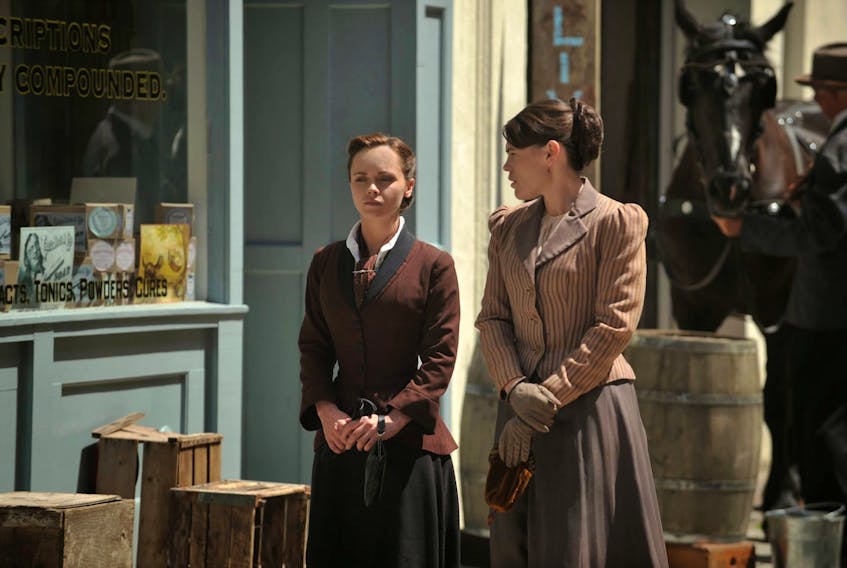
Gary Swim jokes that he got involved in the Nova Scotia film industry early on “as kind of a mistake.”
Nearly four decades later, it’s the best mistake he ever made.
Since that first time in the early 1980s when a friend asked if he could help out on a project at the Atlantic Filmmakers Co-operative, Swim has seen the scene grow from the inside as one of its most experienced location managers.
“Then, when Dolores Claiborne came along (in 1994), I realized this could probably be a career, and the business just kept going and going,” he says from his new home in New Brunswick. “Of course, it’s changed dramatically technically since I started.”
In more recent years, Swim has been part of the team on series like Lifetime’s The Lizzie Borden Chronicles and CBC-TV’s Diggstown, helping to find and negotiate the use of unique sites around the province that give local productions a sense of visual flair and a strong flavour of the area, even when the project in question isn’t even set here.
The unique set of skills required to be a location scout or manager include having an encyclopedic geographical knowledge of the region, as well as being the kind of people person who can gently persuade a property owner into allowing a film crew to take over their home or building for days or weeks at a time.
Starting local
It’s a skillset he picked up on the fly while working on the landmark 1988 independent Nova Scotia production Life Classes for director William MacGillivray. Prior to that, he was with Halifax’s Citadel Communications making television commercials and promotional films while acting as co-ordinator for AFCOOP. Luckily, their offices were right next door to each other on Barrington Street, with the original National Film Board of Canada building just down the block.
“I had quite a few creative film people around me the whole time, and things really started to graduate in this business and it started to grow in that mid-’80s environment,” he recalls. “And I had to make a decision whether I wanted to be an arts administrator or did I want to follow the team and work in production.”
To put the Nova Scotia film scene at the time in perspective, the Atlantic Film Festival had been up and running since 1980, and the national film industry support agency Telefilm opened its Atlantic regional office in Halifax in 1984. There was also support from the NFB for documentaries and other projects.
The film community began to grow organically with commercial and independent projects, and filmmakers like MacGillivray and Lulu Keating, who were both at AFCOOP, and brothers Michael and Paul Donovan at Salter Street Films (which later became DHX and WildBrain).
Swim calls Life Classes a “trial by fire” with many on the crew learning their jobs as they went, but the final result would earn five Genie Award nominations and acclaim at the 38th Berlin International Film Festival and elsewhere.
“I was the location department, doing everything from schlepping garbage to running around talking to people and making deals,” he recalls. “It was crazy, but I didn’t know any better at the time, and I learned a great deal about every aspect of the job on that show alone.”
A shot with Hollywood
“One of the beautiful things about my career... once you start building a resume and you’re only one of a few people around that does your job, as the business is starting to grow you get nabbed up continuously.”
- Gary Swim
After another MacGillivray project, the 1989 punk rock drama The Vacant Lot, and a pair of TV movies, Swim received his first opportunity to work on a big-budget Hollywood production. Based on the Stephen King novel, Dolores Claiborne became a huge boon to the local film industry with a huge crew requirement of around 300 people and locations across the province.
Directed by Taylor Hackford, the film starred Kathy Bates and Jennifer Jason Leigh with Nova Scotia scenery standing in for New England, from Lunenburg and Blue Rocks to Wolfville’s Acadia University and the Brier Island ferry.
“I went traipsing all across the province, from our headquarters in Lunenburg. We had studios in curling rinks, in the hockey rink at Acadia, makeshift soundstages in a warehouse in Lunenburg and our main set in Blue Rocks.
“It was a great experience, with lots of challenges. At one point we had a fire and lost a set. And although I don’t know the exact figure, I think it was reported that the production left something like $10 to 15 million dollars in the community.”
The 1996 Hollywood-produced romantic comedy Two If By Sea starring Sandra Bullock and Denis Leary, continued Swim’s “South Shore period” of work on U.S. productions looking to make the most of the region’s abundant scenery, the favourable difference between American and Canadian dollars and the relatively new Nova Scotia Film Industry Tax Credit, which was introduced in 1993.
Thanks to those early features, he began making connections outside of the regional filmmaking community, many of which he still counts as professional relationships and personal friendships to this day.
“One of the beautiful things about my career, is there weren’t a lot of us around at first,” says Swim. “But once you start building a resume and you’re only one of a few people around that does your job, as the business is starting to grow you get nabbed up continuously.
“I’ve had a very rewarding career, I don’t even keep a resume anymore, it just kept growing.”
Tech assist
Technology has only helped Swim at his job, with smartphones allowing him to show locations to producers in Toronto or Los Angeles in real-time, and Google Maps replacing the hand-drawn directions he used to create for daily call sheets.
“Even being able to communicate with the people you need to communicate with, like getting permits from city officials or talking to the owners of properties, it’s now either text, email or a quick phone call,” he says. “Probably a quick meeting to sign a deal, but it’s so much more quick and efficient.
“I do feel like you miss out on a lot of the social part of it, but the location management end of things still fosters good social relationships because you still have to meet the people you’re dealing with.”
Over the past decade Swim has found filming sites for Tom Selleck’s Jesse Stone TV movies, Deanne Foley’s comedy feature Relative Happiness and the comedy series Seed. There have also been numerous commercial projects that don’t turn up on his IMDb page, and although he hasn’t worked on a major international film production lately, he takes heart in the emergence of productions like the Yarmouth-shot, Academy Award-nominated The Lighthouse and the recently-filmed The Good House with Sigourney Weaver and Kevin Kline.
Swim talks about retiring from the industry in the near future, hence the new home in St. Andrews, with a number of other capable location managers working in the business, but those thoughts get pushed to the back of his mind every time the phone rings or his inbox fills up with news of another production in the works.
“You get hyped up on these shows, there’s a whole wind up to the level where everything starts going nuts. And then there’s the whole wind down when you’re wrapping up a series,” he says.
“As crazy as this is, and no matter how many times I swear I’ll never do this again — because of the stress and the timing and all of that — when you’re hooked on it ... My brother is a commercial fisherman, and you can’t take the sea out of him. That’s it, it’s part of his life, and I equate it to that in some ways.”








